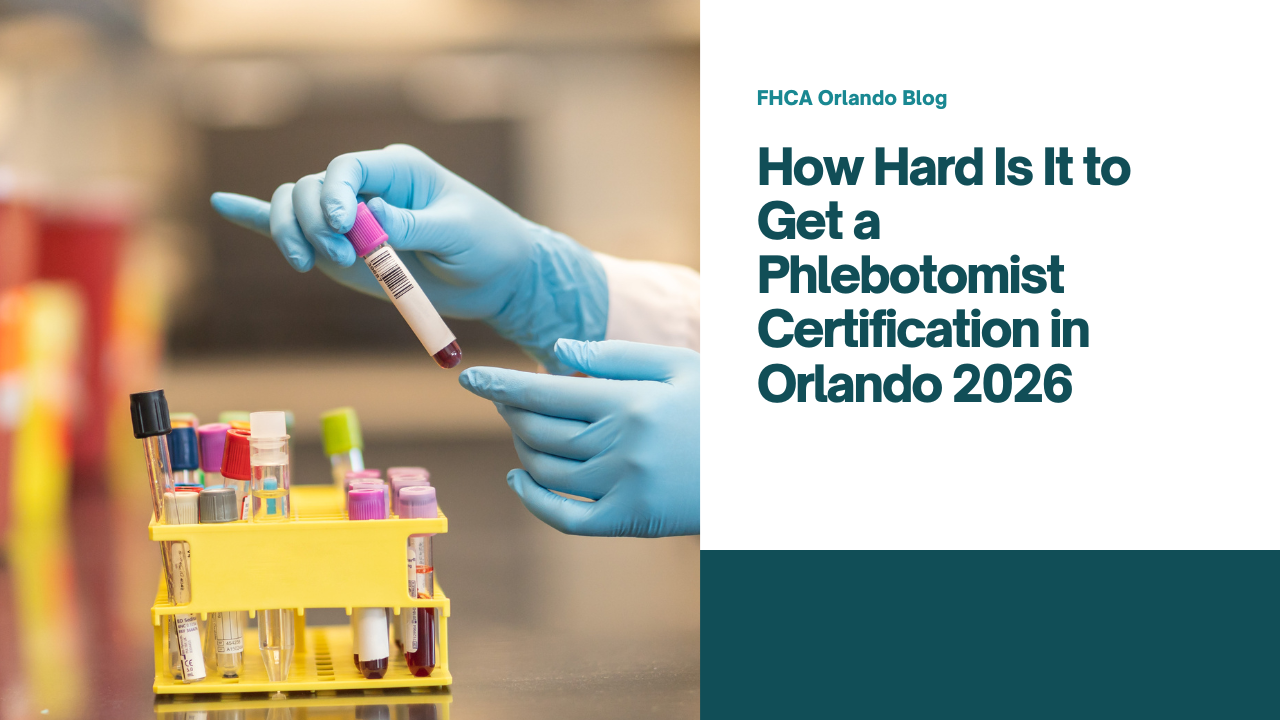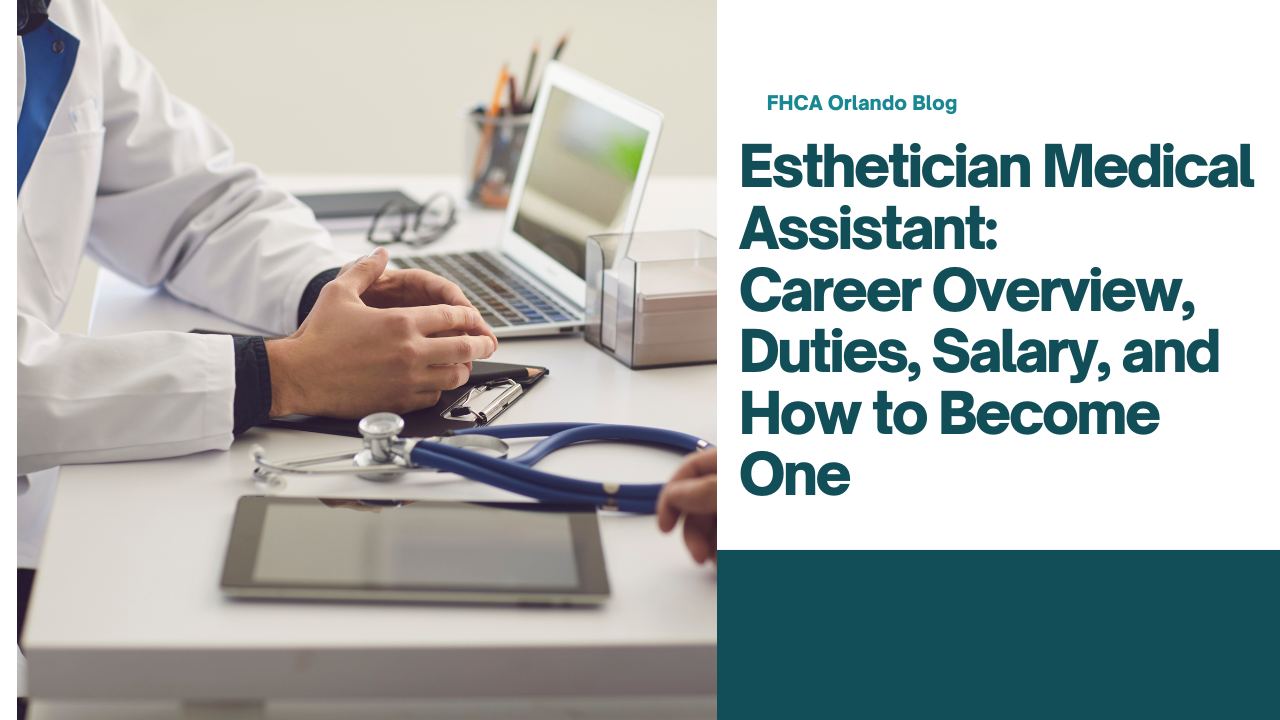How Hard Is It to Get a Phlebotomist Certification in Orlando 2026
Dec 18, 2025
Florida Health Care Academy Orlando makes starting your phlebotomist certification in Orlando in 2026 easier by giving you a clear path from day one. With structured guidance and hands-on support, you build the skills and confidence needed for training and the certification exam.
Beginning with programs like phlebotomy program Orlando helps you establish a strong foundation from the start.
Table of Contents
- What is a phlebotomist certification
- How do I get certified as a phlebotomist in Orlando 2026
- How hard is it to be a phlebotomist in Orlando 2026
- Benefits of being a certified phlebotomist
- The challenges of getting a phlebotomist certification
- Phlebotomist Certification Orlando 2026 FAQs
- Start your phlebotomist certification with FHCA Orlando today
What is a phlebotomist certification
A phlebotomist certification shows that you have the clinical skills, safety knowledge, and professionalism required to perform blood draws across different healthcare environments.
What the certification proves
Your certification proves that you can perform venipuncture safely, identify collection tubes correctly, and follow infection-control standards.
At Florida Health Care Academy Orlando, you’ll develop these skills through hands-on training that prepares you for real patient interactions.
Role of a certified phlebotomist in healthcare
As a certified phlebotomist, you support providers by collecting accurate blood samples that guide testing and treatment decisions.
You’ll help patients feel at ease during the procedure and ensure each specimen is labeled and handled correctly, making your role essential to reliable diagnostic care.
Guides such as phlebotomist education requirements explain how essential your role is in ensuring reliable testing and effective care.
How do I get certified as a phlebotomist in Orlando 2026
The phlebotomy certification process in Orlando follows clear steps that take you from training to exam readiness.
1. Complete a phlebotomy training program
Your training introduces you to venipuncture, patient interaction, sample handling, and clinical safety.
Insights from phlebotomist salary Florida give you a clear picture of the earning potential associated with completing proper training.
2. Complete training and clinical hours
This stage helps you practice under supervision and gain confidence with different types of patients.
At Florida Health Care Academy Orlando, you follow a structured learning process that supports your growth at every step.
3. Take the certification exam
Once you complete your training, you’ll take a certification exam that evaluates your technical skills, safety knowledge, and understanding of proper collection procedures.
This step confirms that you can apply what you practiced in real clinical situations and are ready to work confidently in healthcare settings.
After passing, resources such as what to do after phlebotomy certification help you plan your next steps in the field.
How hard is it to be a phlebotomist in Orlando 2026
Becoming a phlebotomist is very achievable when you have the right preparation and guidance. Developing strong Phlebotomy skills is essential to perform procedures safely, efficiently, and confidently in clinical settings.
Common challenges during training and certification
You may face challenges like learning the correct order of draw, communicating with nervous patients, and building consistency in your technique.
You’ll also adjust to new routines, safety steps, and the pressure of performing accurate draws, all while gaining confidence through guided practice.
Articles such as how to become a travel phlebotomist show how overcoming these challenges can lead to broader opportunities.
Balancing personal life with educational commitments
Balancing school, family, and work requires organization, but structured support from Florida Health Care Academy Orlando makes the process easier to manage.
Benefits of being a certified phlebotomist
A phlebotomist certification offers strong long-term benefits that support your career stability.
Understanding the differences in duties and opportunities through Phlebotomist vs Medical Assistant helps you make informed career decisions.
Career advancement opportunities
You can pursue roles such as lab technician, mobile phlebotomist, or lead phlebotomist, opening the door to greater responsibility and specialization.
Increased earning potential
Your certification qualifies you for higher-paying positions. Insights into phlebotomist salary Florida highlight how phlebotomists with proper training benefit from stronger starting wages.
Enhanced job security
Healthcare facilities across Orlando consistently need trained phlebotomists. Graduates from Florida Health Care Academy Orlando, enter the field with the skills employers value most.
The challenges of getting a phlebotomist certification
Although the path is straightforward, staying committed helps you handle common challenges successfully.
Passing the certification exam
You must demonstrate knowledge of safety practices, venipuncture steps, and patient identification, along with your ability to apply these skills in different scenarios.
Steady practice and familiarity with common procedures help you approach the exam with clarity and confidence.
Maintaining certification
Keeping your certification active requires staying updated on safety guidelines, following renewal timelines, and continuing to practice proper procedures.
This ongoing commitment ensures you maintain strong skills and meet industry expectations over time.
Balancing education with other responsibilities
Managing personal responsibilities while training can feel challenging, especially when juggling work or family needs.
With the structured support at Florida Health Care Academy Orlando, you follow a clear plan that helps you stay organized and committed to your goals.
Phlebotomist Certification Orlando 2026 FAQs
How long does it take to become a certified phlebotomist in Orlando?
The timeline depends on your training schedule and how soon you take your exam.
What is required to become a phlebotomist in Orlando?
You must complete a phlebotomy training program and pass a national certification exam.
How long does phlebotomy training take in Orlando?
Training varies by school but always includes supervised practice.
What certifications do you need to become a phlebotomist in Orlando?
You typically complete a national certification exam through an approved agency.
Do you need prior experience to become a phlebotomist in Orlando?
No. Training teaches you the skills you need step by step.
Start your phlebotomist certification with FHCA Orlando today
Choosing the right school lays the foundation for your success. At Florida Health Care Academy Orlando, you learn hands-on clinical skills and gain the support you need to enter the field with confidence.
Start today through Enrollment and explore the medical assistant program Orlando to take your next step toward certification.










